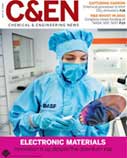Jul 15 2009
In an effort to make coal a cleaner energy source, an increasing number of companies are engaged in multimillion dollar efforts to develop and test technologies to capture and store carbon dioxide, a source of global warming. That’s the topic of a noteworthy article in the current issue of Chemical & Engineering News, ACS’ weekly newsmagazine.

C&EN senior correspondent Ann Thayer notes in the article that coal accounts for 40 percent of power generation worldwide and experts expect it to play an even larger role in the future as energy needs arise. Several organizations, including an intergovernmental policy advisor called International Energy Agency, have identified carbon capture and storage (CCS) as a promising approach to reducing emissions. The process can involve using certain chemicals to absorb carbon dioxide from power plant flue gases, compressing it, and then storing it elsewhere. Governments around the world have pledged billions for dollars for research and development and CCS demonstration projects, with some countries expected to have commercial-scale plants by 2020.
Several hurdles stand in the way. Companies developing the CCS projects will need to demonstrate that the technology works in coal-fired plants and that it is efficient and cost-effective. Other challenges include transporting and successful storage of the captured carbon dioxide. But with advances in chemical research, including more efficient materials and approaches for removing carbon dioxide, CCS projects are now much more affordable and achievable than previously thought, the article suggests.